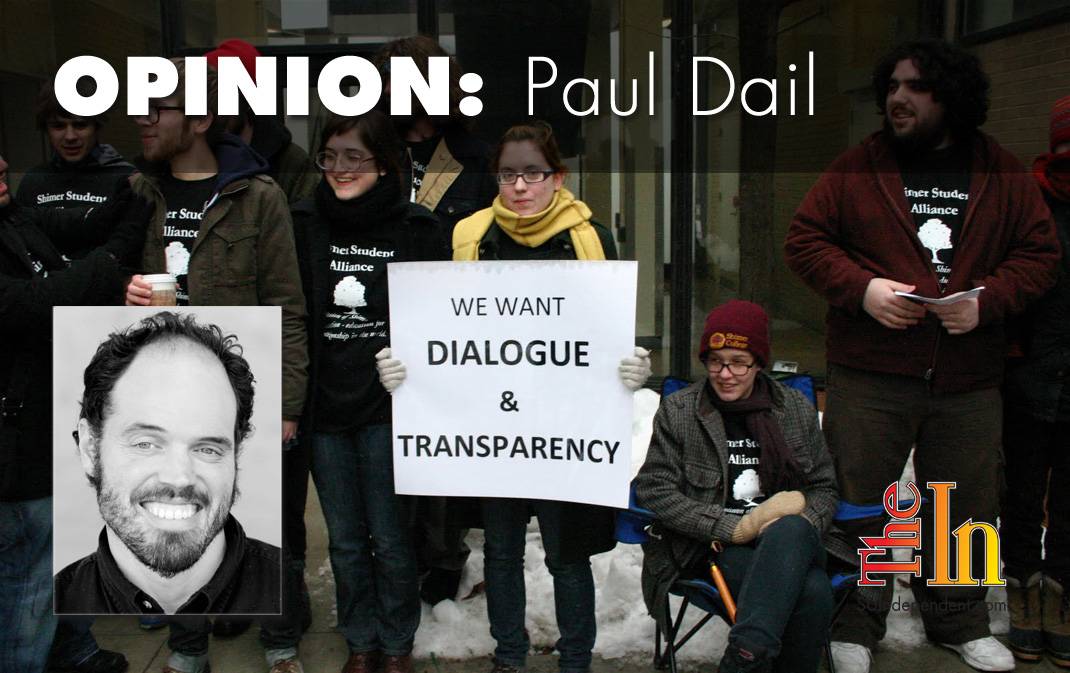
Recently I read a New York Times article about Everett Piper, the president of Oklahoma Wesleyan University, who wrote a post on the university’s website in response to a complaint from one of the students. The student complaint came following a sermon on the topic of 1 Corinthians 13. “It appears that this young scholar felt offended because a homily on love made him feel bad for not showing love,” Piper stated. “In his mind, the speaker was wrong for making him, and his peers, feel uncomfortable.” The post was titled “This Is Not a Day Care. It’s a University!”
Beyond the headlines, sound bites, and quick scans, I haven’t followed in depth all the recent news regarding college student protests at places like the University of Missouri, but the general consensus I’m picking up on from readers is that college students shouldn’t be complaining. I see Facebook memes saying they should just be happy they’re not dying on the shores of Normandy or in Vietnam, but to me, this logic smacks too much of telling a kid who didn’t want to eat their dinner that children were starving in China. Yeah, remember that one?
College students have a right to complain. They may not have a right to actually get everything they want, but are we really going to blame them for trying?

I’ve made no secret of my feelings that if you are getting a free education, you probably just need to do what you’re told in most cases. However, these kids are paying thousands of dollars for their education. College Board reports that “a ‘moderate’ college budget for an in-state public college for the 2015–2016 academic year averaged $24,061.” And that’s just the base model. So let me put it in simpler terms. If you were going to shell out at least $25,000 for a new car (or anything you might spend that much money on), wouldn’t you try to get what you wanted? Shouldn’t students be allowed to have a say in how they are getting that education for which they are going to be paying off for years to come?
Some of you may be saying that analogy is as disconnected as the whole college versus armed forces thing, so let me put it in more academic terms. If you are in higher education—hell, education in general—it’s your job to listen to the students and field their complaints, if for no other reason than that for many of these students, it will be the first time they learn that while their sentiments may have founding, it doesn’t mean they are entitled to see change. Such is not necessarily the way of the world, and the sooner they learn that, the better. However, to be effective, this needs to be taught via another lesson: that of empathy, something else they might not have learned yet. It is not a lesson taught by calling them “self-absorbed and narcissistic” as Oklahoma Wesleyan University’s Piper did.
Back when I taught high school language arts, I wasn’t my students’ friend, but I was one of their favorite teachers. And I believe it was because I showed them that I could be an adult they could trust, someone who would listen to them—actually listen to what they had to say—and empathize whenever possible. I agreed with them at times and even occasionally had my own opinions changed by things they said. And I had to call them on their bullshit the other times, to show them that although their point of view may have been valid in some cases, the adult world just didn’t operate the way they thought it should. But it wasn’t to say it was because they were just full of shit; it was more a lack of something than being full of it.
They just lacked experience. For many of them, they didn’t necessarily know how the adult world worked because they didn’t have examples they trusted. So I tried to play the part of an adult who wasn’t their mom or dad, whether their parents were the types that the kids had figured out were just coddling them, as Piper insisted, or the types who just never listened. My students knew that I didn’t have any other vested interest in “telling them how it is” besides a desire to help them get along in this world and hopefully even make it better.

It’s unfortunate that in many cases such as that of Oklahoma Wesleyan University, either no one has told these students that while they have a right to air their grievances it won’t always change the ways of the world, or it just hasn’t sunk in. However, if such is the case and these students have made it into your higher-education hands and are paying you to show them the ways of the world, you do it.
And it may be the responsibility of today’s adults in more ways than just one. Something that Piper at least admits to in the New York Times article is that the actions of students we are seeing across the country on college campuses are largely the fault of previous generations, both as educators and parents. While technology has certainly had an effect on the Millennials’ behavior, they didn’t create it all themselves. As Piper says, it’s no secret that they’ve been coddled. Millennials were raised believing everyone is a winner and everyone deserves recognition. When they were growing up, we encouraged them to speak up and to express their feelings—which isn’t any thing new, by the way; relationship counseling has been saying for years that you are supposed to use “I feel” language. But now we tell them that it doesn’t matter what they feel.

And talk about something that isn’t new. Unless you have to dig more than two generations back to remember your college education (if you attended college), think about it. Didn’t you have some complaints about the world when you were that age? Weren’t there changes you wanted to see? Weren’t there times where you felt a sense of injustice at your state, maybe even a little persecution? I know I did. I drove around with a bumper sticker that read “If you’re not outraged, you’re not paying attention.” It’s part of the whole gig of being in your late teens and early twenties.
At some point, you learn the ways of the world, the ways that have been illustrated in any number of messages throughout the years. Whether it’s the Serenity Prayer imploring us to accept the things we cannot change or the Rolling Stones telling us we can’t always get what we want, the message is there.
The good news is that some things are worth fighting for. The Serenity Prayer asks for courage to change the things we can, and the Stones tell us we may not get what we want but we can get what we need. But as soon as you tell these students they can’t fight for anything and that they just need to suck it up and stop complaining, there’s a good possibility they’ll stop fighting for everything. I don’t think that’s the message we want to give to the future of our world.




A college experience should be a bit like a flight simularor. As such students learn all of the rules of airing grievances as well as all the possible outcomes. If they don’t always get what they want, they walk.away from the experience better prepared for the day when its the real thing. For this model to really work, there is a measure obligation placed on the institution to make sure the students are heard and they receive feedback. So, if we downgrade our idea of “results” from getting everything they want to being heard and getting a reply (positive or negative), we don’t have to get tangled up in what students may or no be entitled to.